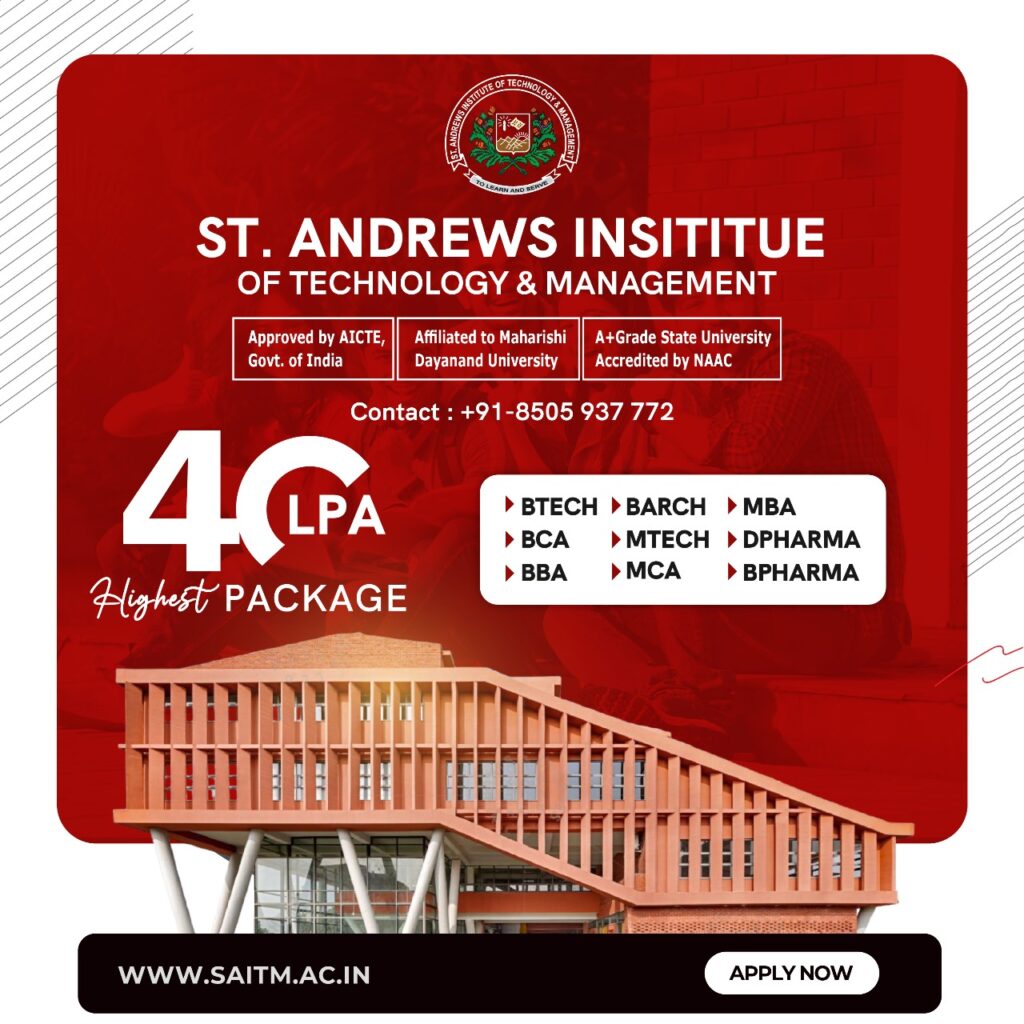MBA specialisation

Image 1-SAITM Girls Hostel
MBA specialisation programs offer a variety of MBA specializations, allowing students to focus on particular areas of business.
Available specializations include finance, marketing, human resources, operations management, entrepreneurship, international business, information technology management, healthcare management, strategy, sustainability, and family business management.
By selecting an MBA specialisation, students can tailor their studies to align more closely with their career objectives and personal interests.
Here are some commonly offered MBA degree specializations:
Finance
Concentrates on areas such as corporate finance, investment banking, financial planning, and risk management.
Marketing
Focuses on strategies for brand management, digital marketing, consumer behaviour, and sales.
Human Resources (HR)
Deals with talent acquisition, employee relations, compensation management, and organizational development.
Operations Management
Involves supply chain management, logistics, production planning, and quality control.
Information Technology (IT)
Merges business strategies with advanced IT applications, managing information systems and digital transformation.
International Business
Prepares students for the global market with training in international trade, cross-cultural management, and global economics.
Entrepreneurship
Encourages students to develop new business ventures with a focus on innovation, business planning, and startup dynamics.
Family Business Management
Offers students the opportunity to expand and strengthen their family businesses, and to venture into entrepreneurship with innovative ideas after receiving proper grooming and skills.
Healthcare Management
An MBA specialisation in healthcare management concentrates on overseeing healthcare institutions, public health policies, and the business aspects of healthcare services.
Strategy
Teaches strategic thinking, business planning, competitive analysis, and long-term decision making.
Sustainability
Promotes knowledge about sustainable practices, environmental considerations in business, and corporate social responsibility.
Some of the most opted courses in India and St. Andrews college or different Engineering college or Management colleges are as follows:-
- Btech
- Btech CSE
- Btech ETCE
- MTech
- BCA
- BBA
- MBA
- MCA
- DPharma – St. Andrews College of Pharmacy
- BPharma – St. Andrews College of Pharmacy
- BArch – St. Andrews College of Architecture
Why you should choose a MBA specialisation

Image 2 – SAITM New Block
Here are several reasons why selecting a specialization is beneficial:
Career Focus
Pursuing an MBA specialisation enables you to focus on particular areas in management, aligning your education with your career aspirations. This targeted approach ensures you acquire skills directly relevant to your professional goals during your degree pursuit.
Depth of Knowledge
Specialized MBA degrees provide comprehensive knowledge and expertise in a specific domain, enabling you to explore relevant theories, concepts, and practices in depth as you pursue your degree.
Skill Development
Specialized MBA degrees empower you to develop specialized skills and competencies highly coveted in the job market. Whether it’s honing analytical skills for finance, nurturing creativity for marketing, or perfecting strategic thinking for consulting, you’ll also refine good communication skills, essential for success in your chosen area of specialization.
Career Advancement
Pursuing an MBA specialisation can enhance your career prospects and open up opportunities for advancement in your chosen field. Employers often seek candidates with specialized expertise, and having a relevant specialization can give you a competitive edge in the job market.
Personal Interest
Opting for a specialized MBA enables you to delve into subjects that truly captivate and motivate you. Whether your enthusiasm lies in finance, marketing, operations, or entrepreneurship, picking a specialization that resonates with your interests can enhance the fulfillment and gratification of your MBA experience.
Networking Opportunities
Within your chosen MBA specialisation, you’ll have opportunities to connect with peers, industry leaders, and alumni who share your professional interests. Networking in your specialized field can cultivate valuable connections, mentorship opportunities, and potential career avenues.
Adaptability
While pursuing a specialized MBA, you receive targeted training in a specific domain while also acquiring transferable skills applicable across diverse industries and positions. The analytical, problem-solving, and leadership abilities honed through your specialization can be effectively utilized in various professional settings.
Types of MBA specialisations list

Image 3 – SAITM C block
Here is the MBA specializations list:
MBA Finance
An MBA specialisation in Finance is a graduate degree program designed to delve into the intricacies of financial management, investments, banking, and risk management, all within the broader framework of business administration.
An MBA course in Finance equips students with a thorough knowledge of essential financial concepts, tools, and techniques. This understanding is crucial for making effective financial decisions in diverse organizational contexts.
MBA students delve into the realms of financial analysis, investment strategies, capital markets, financial modeling, and corporate finance principles.
Subjects in MBA Finance
Here is a list of subjects learned in MBA finance:
Financial Management:
Covers topics such as financial statement analysis, capital budgeting, working capital management, and financial planning.
Investments:
Focuses on investment analysis, portfolio management, asset pricing, and risk management.
Corporate Finance:
Explores topics such as capital structure, cost of capital, dividend policy, mergers and acquisitions, and corporate valuation.
Financial Markets and Institutions:
Examines the structure and functioning of financial markets, including stock markets, bond markets, derivatives markets, and banking institutions.
Risk Management:
Covers techniques for identifying, assessing, and managing financial risks, including credit risk, market risk, and operational risk.
Future Scope
Graduates who pursue an MBA specialisation in Finance have diverse career opportunities across various industries. These include roles in banking, investment management, corporate finance, consulting, and financial services. The MBA specialisation in finance provides students with the essential skills to succeed in finance-related roles.
With the increasing complexity of financial markets and regulatory environment, there is a growing demand for skilled finance professionals who can navigate these challenges and drive financial performance and growth.
Companies Hiring
- Investment Banks: Goldman Sachs, J.P. Morgan Chase, Morgan Stanley
- Asset Management Firms: BlackRock, Vanguard, Fidelity Investments
- Corporate Finance Departments: Apple, Google, Microsoft
- Consulting Fir
MBA in Marketing management specialisation

Image 4 – SAITM boys hostel
An MBA course in Marketing is a specialized graduate program that concentrates on key areas such as marketing management, consumer behaviour, brand management, market research, and digital marketing, all within the scope of broader business administration.
An MBA specialisation in Marketing equips students with the necessary knowledge and skills to cultivate and execute effective marketing management strategies, oversee marketing campaigns, and propel business expansion through the acquisition and retention of customers.
Subjects in MBA Marketing
Here is a list of subjects learned in MBA in marketing:
Marketing Management Specialization:
Covers strategic marketing management planning, product development, pricing strategies, distribution channels, and marketing communications.
Consumer Behaviour:
In an MBA specialisation, students delve into the drivers impacting consumer decision-making and gain strategies to effectively address consumer needs and preferences.
Brand Management:
Focuses on building, managing, and positioning brands in the marketplace to create strong brand equity and customer loyalty.
Market Research:
Explores methods and techniques for gathering, analyzing, and interpreting market data to identify market opportunities, trends, and consumer insights.
Digital Marketing:
Addresses online marketing strategies, including website optimization, search engine marketing (SEM), social media marketing, email marketing, and content marketing.
Future Scope
Students pursuing an MBA specialisation in Marketing encounter diverse career prospects in marketing-related roles across industries such as consumer goods, retail, technology, healthcare, and entertainment.
Within the MBA program landscape, there’s an increasing need for marketers who can harness technology and analytics to steer precise marketing campaigns and gauge marketing impact, propelled by the ascent of digital marketing and data analytics.
Companies Hiring
- Consumer Goods Companies: Procter & Gamble, Unilever, Coca-Cola
- Technology Companies: Apple, Google, Facebook, Amazon
- Retail Companies: Walmart, Target, Amazon
- Advertising Agencies: WPP, Omnicom Group, Publicis Groupe
- Digital Marketing Agencies: Digitas, iProspect, R/GA
Job Profiles
Marketing Manager:
Develops and implements marketing strategies, plans marketing campaigns, and manages marketing activities to achieve business objectives.
Brand Manager:
Through an MBA specialisation, professionals gain the expertise to manage brand positioning, identity, and communication strategies crucial for nurturing and maintaining strong brands in the market.
Digital Marketing Specialist:
Executes digital marketing campaigns across various online channels, including social media, search engines, email, and mobile apps.
Market Research Analyst:
Conducts market research studies, analyzes market data, and provides insights to support marketing decision-making.
Product Manager:
Manages the development, launch, and lifecycle of products or services, working cross-functionally with product development, sales, and marketing teams.
MBA in Human Resource Management

Image 5 – SAITM Boys Hostel
An MBA specialisation in Human Resource Management is a targeted graduate degree program centered on the effective management of human capital within organizations. It prioritizes the cultivation of expertise and proficiency in key areas such as recruitment, talent management, employee relations, training, and organizational development.
The specialized MBA program equips students for leadership roles within HR departments or consulting firms, enabling them to make substantial contributions to strategic HR planning and organizational effectiveness.
Subjects in MBA HRM specialization
Human Resources Management:
Covers topics such as HR strategy, workforce planning, recruitment and selection, performance management, compensation and benefits, and employee relations.
Organizational Behaviour:
Examines individual and group behavior within organizations, including motivation, leadership, communication, team dynamics, and organizational culture.
Training and Development:
Focuses on designing and implementing training programs to enhance employee skills, knowledge, and performance.
Employee Relations:
Addresses employee-employer relationships, conflict resolution, grievance handling, and labor laws and regulations.
Strategic HRM:
Explores the role of HR in driving organizational strategy, aligning HR practices with business goals, and measuring HR effectiveness.
Future Scope
Graduates with an MBA in HRM have diverse career opportunities in HR-related roles across various industries, including corporate, nonprofit, government, and consulting.
With the increasing focus on talent management, employee engagement, and organizational culture, there is a growing demand for HR professionals who can attract, develop, and retain top talent to drive business success.
Companies Hiring
- Fortune 500 Companies: IBM, Microsoft, General Electric
- Consulting Firms: McKinsey & Company, Deloitte, PricewaterhouseCoopers
- Technology Companies: Google, Apple, Facebook
- Financial Services Firms: J.P. Morgan Chase, Goldman Sachs, Citigroup
- Healthcare Organizations: Johnson & Johnson, Mayo Clinic, Kaiser Permanente
Job Profiles
HR Manager:
Develops and implements HR strategies, policies, and programs to support organizational goals and objectives.
Talent Acquisition Specialist:
Manages the recruitment and selection process, identifies talent needs, and attracts qualified candidates to fill positions.
Training and Development Manager:
Designs and delivers training programs to enhance employee skills and competencies, promoting professional development and career growth.
Compensation and Benefits Manager:
Designs and manages employee compensation and benefits programs, ensuring competitiveness and alignment with organizational goals.
Employee Relations Specialist:
Handles employee relations issues, including conflict resolution, grievance handling, and compliance with labor laws and regulations.
MBA in Operational Management

Image 6 – SAITM Campus
An MBA program in Operations Management is a specialized graduate degree program that focuses on managing the production process, supply chain, and operations within organizations. It emphasizes the development of skills and knowledge in areas such as process optimization, quality management, logistics, and supply chain strategy.
The specialized MBA program readies students for leadership positions in operations management, supply chain management, logistics, and manufacturing. Here, they can play pivotal roles in enhancing efficiency, curbing costs, and elevating customer satisfaction.
Subjects in MBA Operations Management
Operations Strategy:
Covers topics such as process design, capacity planning, production scheduling, and inventory management to optimize operations efficiency and effectiveness.
Supply Chain Management:
Explores the design, planning, and management of supply chains, including procurement, logistics, distribution, and supplier relationship management.
Quality Management:
Focuses on quality assurance principles, techniques, and tools to ensure product and service quality, including total quality management (TQM), Six Sigma, and lean manufacturing.
Project Management:
Addresses project planning, execution, and control processes, including project scheduling, budgeting, risk management, and stakeholder communication.
Logistics and Distribution:
Examines transportation, warehousing, and distribution activities to optimize the flow of goods and information throughout the supply chain.
Future Scope
Graduates with an MBA program in Operations have diverse career opportunities in operations-related roles across various industries, including manufacturing, retail, healthcare, transportation, and logistics.
With the increasing complexity of global supply chains and the growing emphasis on lean and agile operations, there is a growing demand for operations managers who can drive operational excellence and continuous improvement.
Companies Hiring
- Manufacturing Companies: Toyota, General Motors, Boeing
- Retail Companies: Walmart, Amazon, Target
- Logistics and Transportation Companies: FedEx, UPS, DHL
- Healthcare Organizations: Johnson & Johnson, Mayo Clinic, Kaiser Permanente
- Consulting Firms: Accenture, Deloitte, Boston Consulting Group
Job Profiles
Operations Manager:
Oversees the production process, supply chain management, and operations to ensure efficient and effective operations.
Supply Chain Manager:
Manages the flow of goods and services from suppliers to customers, optimizing the supply chain for cost-effectiveness and customer satisfaction.
Logistics Manager:
Coordinates transportation, warehousing, and distribution activities to ensure the smooth movement of goods throughout the supply chain.
Quality Assurance Manager:
Implements quality management systems and processes to ensure product and service quality meets or exceeds customer expectations.
Project Manager:
Leads cross-functional teams to execute projects on time and within budget, managing resources, timelines, and risks to achieve project objectives.
MBA in Entrepreneurship

Image 7 – SAITM Project Exhibition
An MBA program in Entrepreneurship is a specialized graduate degree program that focuses on the skills and knowledge needed to start, manage, and grow a successful business venture. It emphasizes the development of entrepreneurial mindset, strategic thinking, innovation, and business acumen.
Additionally, this specialization offers significant value to those interested in family business management, equipping students with the necessary tools to expand and innovate within their family businesses.
The MBA specialisation program prepares students to recognize business opportunities, craft feasible business plans, secure funding, and navigate the intricacies of entrepreneurship.
Subjects in MBA Entrepreneurship
Entrepreneurial Finance:
Covers topics such as venture capital, angel investing, crowdfunding, and financial modeling for startups.
New Venture Creation:
Explores the process of starting a new business, including opportunity identification, market research, business model development, and feasibility analysis.
Innovation and Creativity:
Focuses on fostering innovation and creativity in business, including idea generation, product development, and innovation management.
Business Plan Development:
Guides students through the process of creating a comprehensive business plan, including market analysis, financial projections, and marketing strategies.
Entrepreneurial Leadership:
Examines leadership styles and skills necessary for entrepreneurial success, including vision setting, team building, and decision-making.
Future Scope
Graduates with an MBA program in Entrepreneurship have diverse career opportunities, including starting their own businesses, joining startups, or pursuing entrepreneurship within established organizations.
With the growing emphasis on innovation and entrepreneurship in the global economy, there is a growing demand for entrepreneurs who can identify opportunities, drive innovation, and create value.
Companies Hiring
- Startups: Airbnb, Uber, SpaceX
- Venture Capital Firms: Sequoia Capital, Andreessen Horowitz, Accel Partners
- Corporate Incubators and Accelerators: Google Ventures, Microsoft Ventures, IBM Alpha Zone
- Entrepreneurial Support Organizations: Y Combinator, Techstars, Startup Grind
- Social Enterprises: TOMS Shoes, Warby Parker, Patagonia
Job Profiles
Founder/Entrepreneur:
Starts and manages their own business venture, taking responsibility for strategic direction, operations, and growth.
Venture Capitalist:
Invests in and provides strategic guidance to early-stage startups, evaluating investment opportunities and managing investment portfolios.
Corporate Entrepreneur:
Drives innovation and new business development within established organizations, leading intrapreneurial initiatives and launching new products or services.
Startup Consultant:
Provides advice and support to startups on various aspects of business development, including strategy, marketing, finance, and operations.
Entrepreneurship Educator:
Teaches entrepreneurship courses and workshops at universities, business schools, or entrepreneurship centers, sharing knowledge and insights with aspiring entrepreneurs.
MBA in International Business management

Image 8 – SAITM Awards
An MBA in International Business Management is a specialized graduate degree program that focuses on the global aspects of business, including international trade, multinational operations, cross-cultural management, and global strategy.
The program prepares students for careers in multinational corporations, international trade organizations, consulting firms, and government agencies with a global focus.
Subjects in MBA International Business
Global Strategy:
Covers topics such as international market entry strategies, global competitive analysis, and multinational strategic alliances.
International Marketing:
Explores strategies for marketing products and services in diverse cultural and economic environments within the realm of international management, encompassing market research, segmentation, and positioning.
International Finance:
Focuses on managing financial operations in a global context, including foreign exchange risk management, international investment analysis, and global capital markets.
Cross-Cultural Management:
Examines cultural differences and their impact on business management practices, communication, negotiation, and leadership in international settings.
International Trade and Law in Business Management: Addresses the legal and regulatory aspects of international trade within the context of business management, including trade agreements, tariffs, customs, and export-import regulations.
Future Scope:
Graduates with an MBA in International Business Management have diverse career opportunities in global business roles across various industries, including multinational corporations, international trade organizations, consulting firms, and government agencies.
With globalization and the increasing interconnectedness of economies, there is a growing demand for professionals who can navigate the complexities of international business management and drive global expansion and growth.
Companies Hiring
- Multinational Corporations: Coca-Cola, Toyota, Samsung, Nestle
- Consulting Firms: McKinsey & Company, Deloitte, PricewaterhouseCoopers
- International Trade Organizations: World Trade Organization (WTO), International Monetary Fund (IMF), World Bank
- Global Logistics and Supply Chain Companies: DHL, Maersk, FedEx
- Government Agencies: United States Department of Commerce, Export-Import Bank of the United States, Foreign Trade Commission
Job Profiles
International Business Development Manager:
Identifies and evaluates global market opportunities, develops entry strategies, and establishes partnerships and alliances to expand international business operations.
International Marketing Manager:
Develops and implements marketing strategies tailored to international markets, including product localization, branding, and promotional campaigns.
Global Supply Chain Manager:
In the realm of international management, oversees global logistics and supply chain operations, encompassing sourcing, procurement, transportation, and distribution, with the aim to optimize efficiency and minimize costs.
International Trade Compliance Manager:
Ensures compliance with international trade regulations and export-import laws, including export controls, customs regulations, and trade sanctions.
Global Strategy Consultant:
Advises multinational corporations on global business strategy, market entry strategies, competitive analysis, and organizational transformation initiatives.
MBA in Information Technology Management

Image 9- SAITM Campus
An MBA in Information Technology Management is a specialized graduate degree program that focuses on the intersection of business management and information technology (IT). It emphasizes the development of skills and knowledge needed to effectively manage IT resources, projects, and strategies within organizations.
The program prepares students for leadership roles in IT departments, technology consulting firms, and technology-driven organizations, where they can leverage technology to drive innovation, efficiency, and business growth.
Subjects in MBA Information Technology Management
IT Strategy and Management:
Covers topics such as IT governance, strategic planning, project management, and risk management in the context of IT.
Enterprise Systems:
Explores the design, implementation, and management of enterprise-wide IT systems, including enterprise resource planning (ERP), customer relationship management (CRM), and supply chain management (SCM) systems.
Information Security and Privacy:
Addresses cybersecurity threats, data privacy regulations, risk assessment, and security best practices to protect organizational assets and information.
IT Project Management:
Focuses on managing IT projects throughout the project lifecycle, including project initiation, planning, execution, monitoring, and closure.
Emerging Technologies:
Examines trends and developments in emerging technologies such as cloud computing, artificial intelligence (AI), machine learning, big data analytics, and Internet of Things (IoT).
Future Scope
Graduates with an MBA in Information Technology Management have diverse career opportunities in IT leadership and management roles across various industries, including technology, finance, healthcare, retail, and consulting.
With the increasing reliance on technology-driven business models and digital transformation initiatives, there is a growing demand for IT managers who can align IT strategies with business objectives, drive innovation, and manage IT resources effectively.
Companies Hiring
- Technology Companies: Google, Microsoft, Amazon, Apple
- Financial Services Firms: J.P. Morgan Chase, Goldman Sachs, Visa
- Healthcare Organizations: Mayo Clinic, Kaiser Permanente, Cerner Corporation
- Consulting Firms: Accenture, Deloitte, IBM Consulting
- Retail Companies: Walmart, Target, Amazon
Job Profiles
Chief Information Officer (CIO):
Leads the IT department, develops IT strategies, and oversees the implementation of IT systems and projects to support organizational goals.
IT Project Manager:
Manages IT projects, including software development, infrastructure upgrades, and system implementations, ensuring projects are completed on time, within budget, and meet quality standards.
IT Consultant:
Provides technology advisory and consulting services to clients, helping them align IT strategies with business objectives, evaluate technology solutions, and implement digital transformation initiatives.
Information Security Manager:
Manages cybersecurity programs, conducts risk assessments, implements security controls, and ensures compliance with data privacy regulations to protect organizational assets and information.
Technology Innovation Manager:
Identifies emerging technologies, evaluates their potential impact on business operations, and leads initiatives to pilot, implement, and scale innovative technology solutions to drive business growth and competitiveness.
MBA in Healthcare Management

Image 10 – SAITM C Block
An MBA in Healthcare Management is a specialized graduate degree program that focuses on the business aspects of healthcare delivery, administration, and management. It emphasizes the development of skills and knowledge needed to lead and manage healthcare organizations effectively.
The program prepares students for leadership roles in hospitals, healthcare systems, pharmaceutical companies, insurance firms, consulting firms, and government agencies involved in healthcare delivery and administration.
Subjects in MBA Healthcare Management
Healthcare Policy and Regulations:
Covers healthcare laws, regulations, and policies affecting healthcare delivery, reimbursement, and compliance.
Healthcare Economics:
Examines the economic principles and factors influencing the healthcare industry, including healthcare financing, reimbursement models, and cost-effectiveness analysis.
Healthcare Operations Management:
Focuses on optimizing healthcare delivery processes, resource allocation, quality improvement, and patient satisfaction.
Healthcare Information Systems:
Explores the use of information technology in healthcare, including electronic health records (EHR), health information exchange (HIE), and healthcare analytics.
Healthcare Strategy and Marketing:
Addresses strategic planning, market analysis, branding, and marketing strategies in the healthcare industry.
Future Scope
Graduates with an MBA in Healthcare Management have diverse career opportunities in healthcare management and administration roles across various sectors of the healthcare industry.
With the increasing demand for healthcare services, aging population, and healthcare reform initiatives, there is a growing need for healthcare managers who can navigate complex regulatory environments, manage costs, and improve healthcare quality and outcomes.
Companies Hiring
- Hospitals and Healthcare Systems: Mayo Clinic, Cleveland Clinic, Kaiser Permanente
- Pharmaceutical Companies: Pfizer, Merck, Johnson & Johnson
- Healthcare Consulting Firms: Deloitte, McKinsey & Company, Boston Consulting Group
- Health Insurance Companies: UnitedHealth Group, Anthem, Aetna
- Government Agencies: Centres for Medicare & Medicaid Services (CMS), Department of Health and Human Services (HHS), Food and Drug Administration (FDA)
Job Profiles
Healthcare Administrator:
Oversees the day-to-day operations of healthcare facilities, including staffing, budgeting, patient care, and regulatory compliance.
Healthcare Consultant:
Provides strategic advice and consulting services to healthcare organizations, helping them improve operations, efficiency, and patient outcomes.
Healthcare Policy Analyst:
Analyzes healthcare policies, regulations, and legislation, and advises policymakers and healthcare organizations on their implications and implementation.
Healthcare Information Systems Manager:
Manages the implementation, maintenance, and optimization of healthcare information systems to support clinical and administrative processes.
Healthcare Quality Improvement Manager:
Leads initiatives to improve healthcare quality, patient safety, and outcomes through performance measurement, data analysis, and process improvement methodologies.
MBA in Strategy

Image 11- Management Computer LAB
An MBA degree with a specialization in Strategy is a focused graduate program designed to cultivate expertise in strategic management and corporate strategy. It highlights the processes of formulating, implementing, and evaluating strategies aimed at attaining organizational objectives and gaining competitive advantage.
The program prepares students for leadership roles in strategic planning, business development, consulting, and general management across various industries and sectors.
Subjects in MBA Strategy
Strategic Management:
Covers theories, frameworks, and tools for analyzing industry dynamics, competitive positioning, and crafting organizational strategies.
Corporate Strategy:
Explores the formulation and implementation of strategies at the corporate level, including diversification, mergers and acquisitions, and strategic alliances.
Business Model Innovation:
Examines innovative approaches to creating and capturing value in business models, including disruptive innovation, platform business models, and ecosystem strategies.
Competitive Intelligence:
Focuses on gathering, analyzing, and interpreting competitive information to inform strategic decision-making and gain competitive advantage.
Strategic Leadership:
Addresses leadership styles, capabilities, and behaviors needed to effectively lead and execute strategic initiatives within organizations.
Future Scope
Graduates with an MBA in Strategy have diverse career opportunities in strategic planning, business development, consulting, and general management roles across various industries and sectors.
With the increasing complexity and uncertainty of the business environment, there is a growing demand for strategic thinkers and leaders who can navigate change, drive innovation, and create sustainable competitive advantage.
Companies Hiring
- Management Consulting Firms: McKinsey & Company, Boston Consulting Group, Bain & Company
- Corporate Strategy Departments: Google, Apple, Amazon, Microsoft
- Investment Banks: Goldman Sachs, Morgan Stanley, J.P. Morgan Chase
- Technology Companies: Facebook, Netflix, Tesla, Salesforce
- Consumer Goods Companies: Procter & Gamble, Unilever, Coca-Cola, PepsiCo
Job Profiles
Strategy Consultant:
Advises clients on strategic issues, conducts industry and market analysis, and develops recommendations to improve business performance and competitiveness.
Corporate Strategist:
Works within organizations to develop and execute corporate-level strategies, including growth initiatives, portfolio management, and strategic partnerships.
Business Development Manager:
Identifies and evaluates new business opportunities, negotiates partnerships and alliances, and drives growth initiatives to expand market presence and revenue streams.
Strategic Planner:
Conducts strategic planning processes, facilitates strategy workshops, and develops strategic plans to guide organizational direction and decision-making.
General Manager:
Leads business units or divisions within organizations, responsible for overall performance, strategic direction, and operational execution to achieve business objectives.
MBA in Sustainability Management

Image 12 – Courses Highlights
An MBA in Sustainability is a specialized graduate degree program that focuses on integrating environmental, social, and governance (ESG) principles into business strategy and operations. It emphasizes the development of sustainable business practices, responsible management, and corporate social responsibility (CSR).
The program prepares students for leadership roles in sustainability management, sustainable development, corporate sustainability, and environmental consulting.
Subjects in MBA Sustainability
Sustainable Business Strategies:
Covers frameworks, tools, and best practices for integrating sustainability into business strategy, operations, and decision-making.
Environmental Management:
Explores environmental issues, regulations, and management approaches related to pollution prevention, resource conservation, and environmental compliance.
Social Responsibility and Ethics:
Addresses ethical considerations, stakeholder engagement, and social impact assessment in business operations and decision-making.
Sustainable Supply Chain Management:
Focuses on integrating sustainability principles into supply chain design, procurement practices, and supplier management to minimize environmental impact and enhance social responsibility.
Sustainable Finance and Investing:
Examines sustainable finance models, green financing mechanisms, and responsible investment strategies aimed at promoting environmental sustainability and social development.
Future Scope
Graduates with an MBA in Sustainability have diverse career opportunities in sustainability management, corporate social responsibility, environmental consulting, and sustainable finance across various industries and sectors.
With the growing recognition of sustainability as a strategic imperative for businesses, there is an increasing demand for professionals with a sustainability management special interest who can spearhead sustainability initiatives, mitigate ESG risks, and generate long-term value for stakeholders.
Companies Hiring
- Sustainable Brands: Patagonia, Interface, Seventh Generation, Ben & Jerry’s
- Renewable Energy Companies: Tesla, Vestas, SolarCity, First Solar
- Environmental Consulting Firms: ERM, Deloitte Sustainability, Accenture Sustainability Services
- Corporate Sustainability Departments: Unilever, Starbucks, Nike, IKEA
- Impact Investing Firms: BlackRock, TPG Capital, Generation Investment Management, Impact Assets
Job Profiles
Sustainability Manager:
Develops and implements sustainability strategies, initiatives, and programs within organizations to reduce environmental impact, promote social responsibility, and enhance corporate reputation.
Environmental Consultant:
Provides expertise and advisory services on environmental issues, sustainability practices, and regulatory compliance to businesses, government agencies, and non-profit organizations.
Corporate Social Responsibility (CSR) Manager:
Manages CSR programs and initiatives, engages with stakeholders, and communicates the organization’s sustainability efforts to internal and external audiences.
Sustainable Investment Analyst:
Conducts research and analysis on ESG factors, evaluates sustainable investment opportunities, and advises investors on integrating sustainability criteria into investment decisions.
Sustainable Supply Chain Manager:
Implements sustainability principles in supply chain management, collaborates with suppliers to improve environmental and social performance, and ensures supply chain transparency and accountability.
MBA in Agri business management programs

Image 13 – SAITM Project Exhibition day
An MBA in Agribusiness specialization focuses on the management aspects of agricultural enterprises, including farming, food production, agri-commodities trading, agro-processing, and rural development. It combines business management principles with agricultural knowledge to address the unique challenges and opportunities in the agricultural sector.
Curriculum
The curriculum typically covers a range of subjects related to agribusiness management, agricultural economics, supply chain management, rural marketing, agricultural finance, farm management, food processing, agricultural policy, and sustainable agriculture.
Elective courses may include topics such as agri-entrepreneurship, agricultural risk management, agricultural marketing, and agricultural value chain management.
Future Scope
Graduates with an MBA in Agribusiness specialization have diverse career opportunities in the agricultural sector and related industries. They can work in roles such as agribusiness managers, farm managers, agricultural consultants, agricultural economists, food industry managers, supply chain managers, agricultural finance analysts, and rural development officers.
With the growing emphasis on sustainable agriculture and food security, there is an increasing demand for professionals who can manage agribusinesses efficiently and sustainably.
MBA agri business placements
Companies hiring MBA graduates with an Agribusiness specialization include agribusiness firms, agricultural input companies, food processing companies, agrochemical companies, agricultural machinery manufacturers, agricultural trading companies, agricultural cooperatives, and government agencies involved in agriculture and rural development.
Job Profiles
Job profiles for MBA graduates in Agribusiness specialization include:
Agribusiness Manager:
Oversees the management and operations of agribusiness enterprises, including planning, production, marketing, and financial management.
Farm Manager:
Manages agricultural production operations on farms, including crop cultivation, livestock management, and farm administration.
Agricultural Consultant:
Provides advisory services to farmers, agribusinesses, and government agencies on agricultural practices, market trends, and policy matters.
Agricultural Economist:
Analyzes economic factors affecting agriculture, such as supply and demand dynamics, pricing trends, and agricultural policy impacts.
Supply Chain Manager:
Manages the flow of agricultural products from farm to market, optimizing logistics, transportation, and distribution processes.
Rural Development Officer:
Implements programs and initiatives to promote rural development, including agricultural extension services, rural infrastructure development, and livelihood enhancement programs.
Selecting right type of MBA specialisation

Image 14 – SAITM Convocation Day
Choosing specialization courses in top MBA degrees entails multiple steps to ensure they align with your career objectives, interests, and market demand.
Self-assessment:
Reflect on your strengths, interests, and career aspirations. Identify your skills, values, and areas of passion to guide your specialization choice.
Research:
Explore the different MBA specializations available and their respective course offerings. Look into the curriculum, subjects covered, and potential career paths associated with each specialization.
Career goals:
Take into account your long-term career objectives and how a particular specialization aligns with them when selecting. Choose a specialization that enriches your skill set and positions you for success in your desired industry or role within business schools.
Industry demand:
Research the current and future demand for professionals with expertise in your chosen specialization. Evaluate job market trends, salary potential, and growth opportunities in relevant industries.
Networking:
Engage with professionals established in your desired field or MBA specialisation. Gather advice, insights, and recommendations from alumni, industry experts, and mentors to guide your decision-making process.
Consultation:
Speak with academic advisors, faculty members, and career counselors at your business school to discuss your specialization options. Seek guidance on course selection, program requirements, and career planning.
Flexibility:
Remain open-minded and ready to explore various specialization options. Look into dual specializations or interdisciplinary programs within business schools that provide a wider skill set and greater flexibility in your career paths.
Personal interests:
Choose a specialization that genuinely interests you and ignites your passion. Enjoying your coursework and finding fulfillment in your studies can enhance your learning experience and career satisfaction.
Difference between MBA Specialisation and MBA concentration

Image 15 – SAITM Project Exhibition 2023
The terms “MBA specialisation” and “major” or “concentration” are often used interchangeably, but there are subtle differences in their meanings and implications within the context of an MBA program:
MBA Specialisation:
An MBA specialisation refers to a focused area of study within the broader MBA curriculum.
Specializations allow students to tailor their MBA experience to their career goals and interests by gaining in-depth knowledge and expertise in a specific functional area of business.
Examples of MBA specializations include Finance, Marketing, Human Resource Management, Operations Management, Entrepreneurship, Information Technology Management, and International Business.
Major or Concentration:
In some MBA degrees, the term “major” or “concentration” may be used instead of specialization.
A major or concentration typically represents a subset of courses within the MBA curriculum that focuses on a specific area of business.
Like specializations, majors or concentrations allow students to deepen their understanding and skills in a particular field of study.
However, majors or concentrations may be more broadly defined and encompass a range of related courses rather than a tightly defined set of electives.
While the terms may differ, the concept remains the same: both MBA specializations and majors or concentrations provide students with the opportunity to delve deeper into specific areas of business that align with their career aspirations. The choice between a specialization and a major or concentration may depend on the terminology used by the MBA program and the level of specificity desired by the student in their course of study.
Exploring best modes of perusing MBA’s

Image 16 – SAITM New Building
The most popular MBA specialisations often encompass various modes of pursuit.
Full-time MBA:
Aspiring professionals opt for a full-time MBA program, immersing themselves in on-campus classes during standard business hours. This avenue offers a comprehensive learning journey, enriched with networking prospects, internships, and extracurricular engagements, characteristic of top MBA experiences.
Part-time MBA:
Designed for working professionals who wish to continue their careers while pursuing an MBA, part-time programs offer evening or weekend classes, allowing students to balance work and studies.
Executive MBA (EMBA):
Tailored for seasoned professionals with extensive managerial backgrounds, Executive MBA (EMBA) specializations or executive MBA programs often adopt a compact schedule, featuring weekend classes or intensive sessions. These offerings prioritize honing leadership skills and implementing business theories into real-world scenarios, making them a distinct facet of MBA specializations.
Online MBA:
Online MBA specializations provide flexibility and convenience, enabling students to engage in coursework remotely through online platforms. This format is ideal for individuals with work or personal commitments seeking to pursue MBA specializations.
Hybrid MBA:
Hybrid MBA specialisation programs blend both online and on-campus learning, offering a combination of in-person and virtual instruction. Participants can attend on-campus sessions while also completing coursework online, providing the flexibility of virtual learning alongside the advantages of specialized MBA degrees.
MBA Admissions in top MBA colleges

Image 17 – SAITM Placements
MBA admission encompasses the process of applying for and gaining entry into Master of Business Administration (MBA) programs offered by colleges or universities specializing in MBA degrees.
The MBA admission process typically involves several steps, including selecting a preferred MBA specialisation, gathering required application materials, submitting standardized test scores, preparing essays or personal statements, securing letters of recommendation, and completing an admissions interview.
Research:
Prospective applicants explore different MBA colleges to find ones that match their career objectives, interests, and preferences, including the availability of suitable MBA specializations. Important factors to evaluate include the college’s reputation, accreditation status, curriculum design, faculty expertise in various MBA specializations, range of MBA specializations available, and geographical location.
Application Preparation:
Applicants gather required application materials, which may include academic transcripts, standardized test scores (such as the GMAT or GRE), letters of recommendation, a resume or curriculum vitae (CV), essays or personal statements, and an application fee.
Entrance Exams:
Many MBA degrees require applicants to take standardized tests such as the Graduate Management Admission Test (GMAT) or the Graduate Record Examination (GRE). These exams assess quantitative, verbal, analytical writing, and critical thinking skills, which are essential for success in various MBA specializations.
Letters of Recommendation:
Applicants typically submit letters of recommendation from academic professors, employers, or professional contacts who can speak to their qualifications, accomplishments, and potential for success in an MBA program.
Essays or Personal Statements:
MBA courses often require applicants to write essays or personal statements that provide insights into their background, experiences, career goals, reasons for pursuing an MBA, and how the program aligns with their objectives.
Application Submission:
Once all required materials are collected and prepared, applicants submit their completed applications through the online application portal or via mail, following the instructions provided by each business school.
Interview:
Some MBA courses require applicants to participate in an admissions interview as part of the application process. Interviews may be conducted in person, over the phone, or via video conference and provide an opportunity for applicants to discuss their qualifications, experiences, and aspirations.
Admission Decision:
After reviewing all application materials, including test scores, transcripts, recommendations, essays, and interviews, the admissions committee evaluates each applicant’s candidacy and makes admission decisions based on academic qualifications, professional experience, leadership potential, and fit with the program.
Enrollment:
Accepted applicants receive admission offers from the MBA degrees to which they applied. Upon acceptance, students typically submit enrollment deposits to secure their spot in the program and complete any additional enrollment requirements.
Top MBA colleges for MBA specializations

Image 18 – SAITM Awards Ceremony
Here are some of the top government MBA colleges in India renowned for offering programs in the most popular MBA specialisations.
Indian Institutes of Management (IIMs):
The IIMs are widely regarded as the apex of management education in India, offering specialized streams in Finance, Marketing, Operations, Human Resources, Strategy, Business Analytics, and other fields. Each IIM boasts distinct strengths and distinctive program offerings.
Faculty of Management Studies (FMS), University of Delhi:
FMS Delhi offers specializations in areas like Finance, Marketing, Operations, Human Resource Management, and Business Analytics. It is known for its rigorous academic curriculum and industry-oriented approach.
Department of Management Studies (DoMS), Indian Institutes of Technology (IITs):
Several IITs, including IIT Bombay, IIT Delhi, IIT Kharagpur, and others, offer specialized MBA degrees with concentrations in areas such as Operations Management, Information Technology Management, Finance, Business Analytics, and more.
Jamnalal Bajaj Institute of Management Studies (JBIMS), Mumbai:
JBIMS offers specializations in Finance, Marketing, Operations, Human Resource Management, Information Management, and Business Analytics. It is known for its industry-oriented curriculum and strong corporate connections.
Shailesh J. Mehta School of Management (SJMSOM), Indian Institute of Technology Bombay:
SJMSOM offers specializations in areas like Operations, Supply Chain Management, Marketing, Finance, Information Technology Management, Business Analytics, and General Management.
Department of Management Studies (DoMS), Indian Institute of Science (IISc) Bangalore:
DoMS IISc offers specializations in areas like Technology Management, Operations Management, Business Analytics, and Finance. It is known for its interdisciplinary approach and research-oriented curriculum.
National Institute of Industrial Engineering (NITIE), Mumbai:
NITIE offers specialized programs in areas such as Operations Management, Supply Chain Management, Industrial Engineering, Project Management, Business Analytics, and more. It is known for its focus on industrial and operational excellence.
Indian Institute of Forest Management (IIFM), Bhopal:
IIFM offers specializations in areas like Environmental Management, Sustainability, Natural Resource Management, Rural Management, and Business Analytics. It is known for its focus on sustainable development and environmental conservation.
Xavier Institute of Management Bhubaneswar (XIMB):
XIMB offers specializations in areas like Business Analytics, Human Resource Management, Marketing, Finance, Operations, and Sustainability Management. It is known for its academic rigor and industry relevance.
National Institute of Technology (NITs) and other Central Universities:
Several NITs and Central Universities offer MBA programs with specializations in various fields of management, including Finance, Marketing, Human Resources, Operations, and more.
Unlocking MBA Admissions: Insider Tips and Essential Advice

Image 19 – SAITM Convocation Celebration
Here are some insider tips for MBA admissions:
Start Early:
Begin your preparation for MBA admissions well in advance to allow ample time for researching programs, studying for entrance exams, and crafting strong application materials.
Research Programs:
Take the time to thoroughly research MBA programs to find the ones that best align with your career goals, interests, and learning preferences.
Focus on Fit:
Tailor your application materials to each program, demonstrating a clear understanding of how the program’s strengths and offerings align with your goals and aspirations.
Highlight Leadership and Achievements:
Emphasize your leadership experiences, achievements, and impact in your resume, essays, and interviews to showcase your potential as a future business leader.
Prepare for Entrance Exams:
Dedicate sufficient time to prepare for entrance exams such as the GMAT or GRE, focusing on areas where you need improvement and taking practice tests to build confidence.
Seek Feedback:
Don’t hesitate to seek feedback on your application materials from mentors, peers, or admissions consultants to ensure they effectively communicate your strengths and suitability for the program.
Craft Compelling Essays:
Write authentic and compelling essays that reflect your unique experiences, motivations, and aspirations, showcasing your personality and fit with the program.
Network with Current Students and Alumni:
Connect with current students and alumni of MBA programs to gain insights into the culture, curriculum, and opportunities offered by different programs, and to demonstrate your interest and enthusiasm.
Prepare for Interviews:
Practice for MBA interviews by researching common interview questions, articulating your career goals and motivations clearly, and demonstrating your fit with the program.
Stay Organized and Deadline-Aware:
Keep track of application deadlines and requirements for each program, staying organized and proactive to ensure you submit high-quality applications on time.
Admission process for MBA specialization

Image 20 – SAITM Admin Block
Master of Business Administration (regularly abbreviated to MBA) is a postgraduate academic degree. Individuals who concentrate on an MBA have a degree in one more field of academics.
Regularly, a graduate degree is required, yet bachelor’s college degree holders with work experience are acknowledged once in a while. In contrast to different study spaces, MBA courses are frequently focused on individuals who work and should be possible in low maintenance, including distance education.
MBA programs normally require two years, full-time. The principal target bunch for MBAs is engineers, legal advisors, specialists of medication, and others with a foundation in the humanities. The MBA can give those individuals capabilities in administration positions
Eligibility criteria for MBA programs
Eligibility criteria for MBA programs typically include a bachelor’s degree from a recognized institution, preferably with some work experience, standardized test scores (such as the MAT or CAT), English language proficiency for international applicants, letters of recommendation, and a statement of purpose.
While specific requirements vary between institutions, these criteria serve as common benchmarks for admission. Prospective applicants should carefully review the eligibility requirements of individual MBA programs to ensure they meet the necessary qualifications before applying. Additionally, some programs may have additional criteria or preferences, so thorough research is essential to maximize chances of acceptance.
Duration of MBA degree
The duration of MBA programs varies based on format. Full-time MBA programs usually last two years, with four semesters. Part-time options extend over 2 to 5 years. Executive MBA (EMBA) programs, tailored for experienced professionals, last 12 to 24 months, often with weekend classes.
Online MBAs offer flexible durations, ranging from 1 to 3 years, allowing students to pace their studies. Each format caters to different needs, with full-time providing immersion, part-time offering flexibility for working professionals, EMBA targeting executives, and online programs accommodating varied schedules. Prospective students should choose based on career goals, lifestyle, and learning preferences.
Fee structure of MBA degree
MBA program fees vary widely depending on factors such as the reputation of the business school, program format, location, and additional expenses.
When looking to pursue MBA, tuition fees typically constitute the majority of the total cost and can range from a few thousand dollars to over six figures for MBA courses in top-tier programs.
In addition to tuition, students may incur additional expenses such as registration fees, course materials, textbooks, technology fees, and living expenses (if attending a residential program) for MBA courses.
Many business schools offer financial aid, scholarships, grants, and assistantships to help students offset the cost of their MBA education. It’s essential to research and explore these funding options to minimize the financial burden.
Top MBA entrance exam
Several entrance exams are widely recognized for MBA admissions in India. Here are some of the top entrance exams:
CAT (Common Admission Test):
Conducted by the Indian Institutes of Management (IIMs), CAT is one of the most popular and competitive MBA entrance exams in India. Scores are accepted by various management institutes across the country.
XAT (Xavier Aptitude Test):
Conducted by XLRI Jamshedpur on behalf of Xavier Association of Management Institutes (XAMI), XAT is accepted by over 150 management institutes for admission to their MBA programs.
NMAT (NMIMS Management Aptitude Test):
Conducted by the Graduate Management Admission Council (GMAC), NMAT is accepted by NMIMS and other leading B-schools in India.
IIFT (Indian Institute of Foreign Trade) Entrance Exam:
Conducted by the Indian Institute of Foreign Trade, IIFT exam is for admission to its MBA in International Business program.
TISSNET (Tata Institute of Social Sciences National Entrance Test):
Conducted by TISS, TISSNET is for admission to its various management programs.
Other considerations
When contemplating an MBA program, it’s crucial to look beyond duration and fees. Prospective students should assess program reputation, accreditation, curriculum quality, faculty expertise, alumni network, and career services. Additionally, consider opportunities for experiential learning, internships, and international exposure.
When evaluating MBA courses, thoroughly review program details, including course offerings, specializations, elective options, and opportunities for customization. This comprehensive approach ensures alignment with career goals and maximizes the potential for a fulfilling and impactful educational experience.
FAQ’s
MBA specialisation
MBA specializations encompass focused areas of study within the broader field of business administration, allowing students to tailor their education to specific career interests and goals. These specializations typically include disciplines such as finance, marketing, human resource management, operations management, entrepreneurship, and more. Each specialization provides in-depth knowledge and skills relevant to its respective area, preparing graduates for roles in various industries and sectors.
Which MBA Specialisation is best?
The “best” specialization depends on your career goals, interests, and skills. Popular specializations include Finance, Marketing, Human Resources, Operations, Information Technology, and Entrepreneurship.
How many specializations are there in MBA?
Business schools typically offer a diverse array of MBA specializations, with the number of options ranging from 2 to over 20, depending on the institution. Popular specializations within an MBA program include Finance, Marketing, Human Resources, Operations, and Information Technology.
Which degree is best for MBA?
Any bachelor’s degree from a recognized university is generally acceptable for MBA admission. However, degrees in business, economics, engineering, or related fields may provide a solid foundation for MBA studies.
Which MBA specialisation is best for government jobs?
Specializations like Public Policy, Public Administration, or Management with a focus on Government Sector Management can be suitable for government job aspirants.
How can I get admission in MBA?
Admission criteria vary by institution but typically include a bachelor’s degree, entrance exam scores (such as CAT, MAT, GMAT, or others), work experience (for some programs), letters of recommendation, and a statement of purpose.
Is MBA admission open?
MBA admissions usually have specific application periods. It’s advisable to check the websites of the institutions you’re interested in for information on admission timelines and requirements.
Can I do MBA from IIT Kanpur?
Yes, several IITs offer MBA programs. IIT Kanpur also has a Department of Industrial and Management Engineering (IME) that offers MBA programs.
Can I join MBA directly?
Most MBA programs require applicants to have a bachelor’s degree. Some programs may also require work experience, while others may accept students directly after completing their undergraduate studies.





